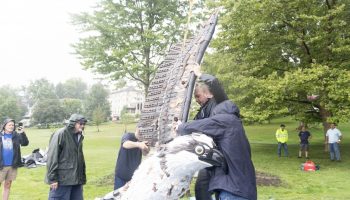Members of Chautauqua’s community gathered for the first Chautauqua Property Owners Association general meeting of the 2022 Summer Assembly on July 9 in the Hall of Philosophy. The CPOA session was followed by the Institution Open Leadership Forum.
The meeting focused on a 2022 summer initiative: an economic impact study conducted by the Institution in collaboration with Parker Philips, a research firm based in Erie, Pennsylvania.
“The first research phase of this project began this past Wednesday (July 6). Survey staff are on the grounds and will be conducting surveys in person for a couple of weeks,” said Erica Higbie, CPOA president.
The purpose of the study is to provide the Institution and the CPOA with insight into Chautauqua’s impact the surrounding regions.
“If you don’t have the time to take the survey on the spot, they do provide you with the directions to the online version,” Higbie said. “Property owners will receive a survey delivered to their door.”
The meeting also included updates regarding nominations for the upcoming election of a Class B trustee to the Institution board of trustees, as well as brief updates from CPOA’S Ombudsman Committee, Communications Committee and Property Owners Who Rent group. Shannon Rozner, senior vice president of community relations and general counsel for the Institution, and Billy Leone, officer in charge at the Chautauqua Police Department, then provided an update on Institution safety and security procedures. Rozner said the Institution has taken a fresh look at its security procedures in light of recent national events. The department has also stepped up enforcement efforts designed to maintain Chautauqua’s ambiance, which include initiatives such as increased patrols for parking violations.
The meeting then touched on the CPOA’s Dark Sky Initiative. The CPOA partners on this work with the Chautauqua Utility District.
“This year is the 13th year that we’ve been working on this project,” said Bill Neches, a Class B trustee of the Institution and member of the CPOA Outdoor Lighting Committee. “I’m pleased to tell you that as of the spring of this year, every single light that was originally owned by National Grid have all been replaced with low-wattage LEDs, which are the appropriate color, temperature and, most importantly, dark sky lighting.”
The Outdoor Lighting Committee hopes that the new lighting will enable the Institution to be recognized by the International Dark-Sky Association as a Dark Sky Community. This would make Chautauqua the first Dark Sky Community east of the Mississippi River.
The morning then shifted to the Institution Leadership Open Forum to provide an update on the 150 Forward strategic plan. Candace Maxwell, chair of the Institution’s board of trustees, first ran through the strategic plan’s four key objectives: to optimize the Summer Assembly on the grounds; to expand Chautauqua’s convening authority year-round and beyond the grounds; to save Chautauqua Lake; and to find and create new and diverse revenue streams. She then focused on the plan’s “cross-cutting imperatives,” which she defined as, “those critical organizational capacities that touch just about all of what Chautauqua is and does.”
“I wanted to take a few moments to … specifically talk about our efforts to modernize and build the capacity of Chautauqua Institution to meet our future needs,” Maxwell said. “Chautauqua is a very large non-profit organization, but we sometimes don’t think of ourselves that way. We operate at a significant scale, and an increasingly significant scale with respect to our size, and also with respect to the complexity of the organization.”
Maxwell then ticked through the ways the Institution has invested in work inside each of the cross-cutting imperatives. For the imperative to create labor and talent solutions, she said, this includes a reorganization of the Institution’s executive staff and responsibilities; building a human resources department and general counsel’s office and reinvesting in information technology and advancement operations; and the building of a new maintenance facility on Institution property along County Route 33.
Inside the imperative to mobilize technology, Maxwell said, the Institution has invested $5 million to modernize its technology infrastructure organized around the unifying principle of providing an extraordinary patron experience. For IDEA work, Maxwell pointed to the recent completion of an IDEA strategic plan under the leadership of Amit Taneja, who recently entered his second year as Chautauqua’s inaugural chief IDEA officer. The plan sets forth both a moral and business case for IDEA work, and sets forth a the Institution’s aim to be “a national leader and role model in the nonprofit sector in creating a just, equitable and inclusive organization and community,” according to its vision statement.
Finally, on strategic partnerships, Maxwell highlighted how the Institution is stewarding existing partnerships and laying groundwork for new ones. She pointed to the Institution’s Washington D.C. office as a signal to potential partners of Chautauqua’s serious national ambitions. The office also places Chautauqua in proximity to existing partners — such as PBS, the Smithsonian and National Geographic — and national funders. Strategic partnerships also happen on the regional level, Maxwell said, as evidenced by the Institution’s leadership role in Chautauqua Lake stewardship, the newly announced Chautauqua County IDEA Coalition, and staff participation on nonprofit boards.
Maxwell closed by highlighting the Institution’s strategic partnership with the Chautauqua community, and work to strengthen it including a new, unified Community Relations office and two-way communications vehicles.
“We appreciate your partnership with us in all this work, as we all have Chautauqua’s best interest at heart, and we all share responsibility for this place and mission,” she said.




